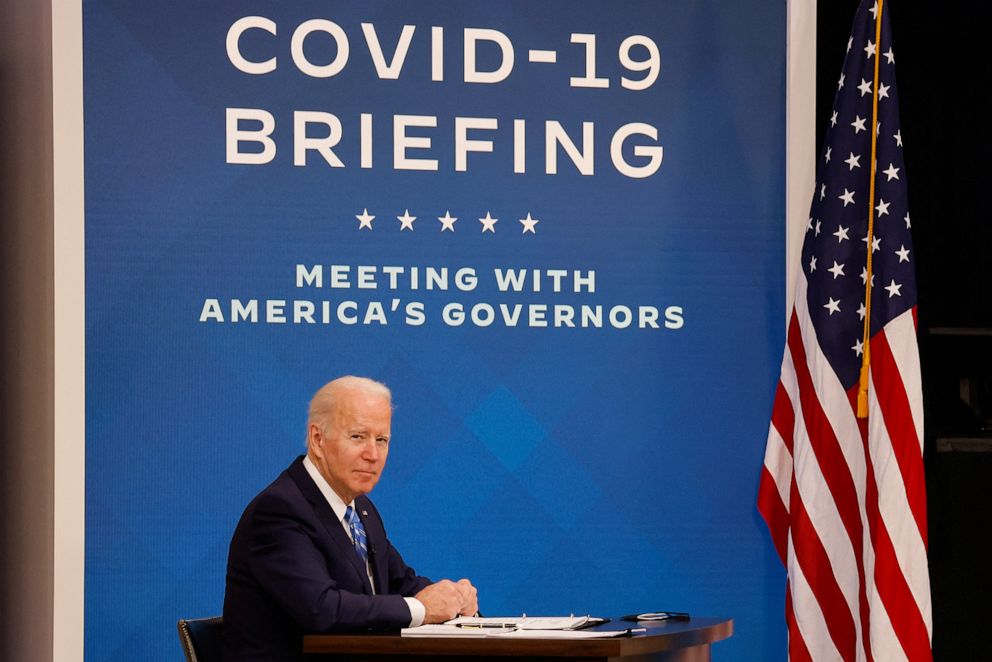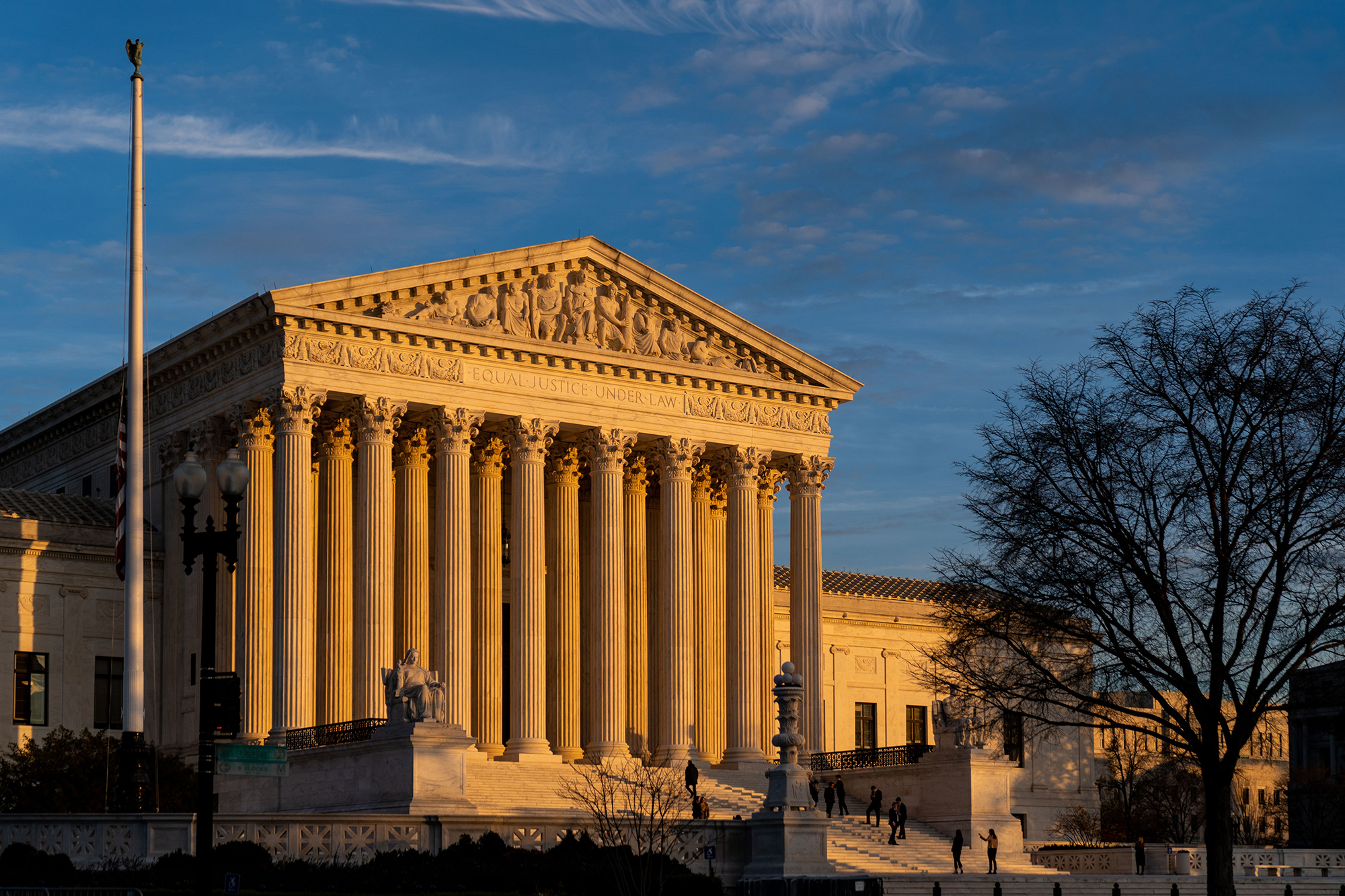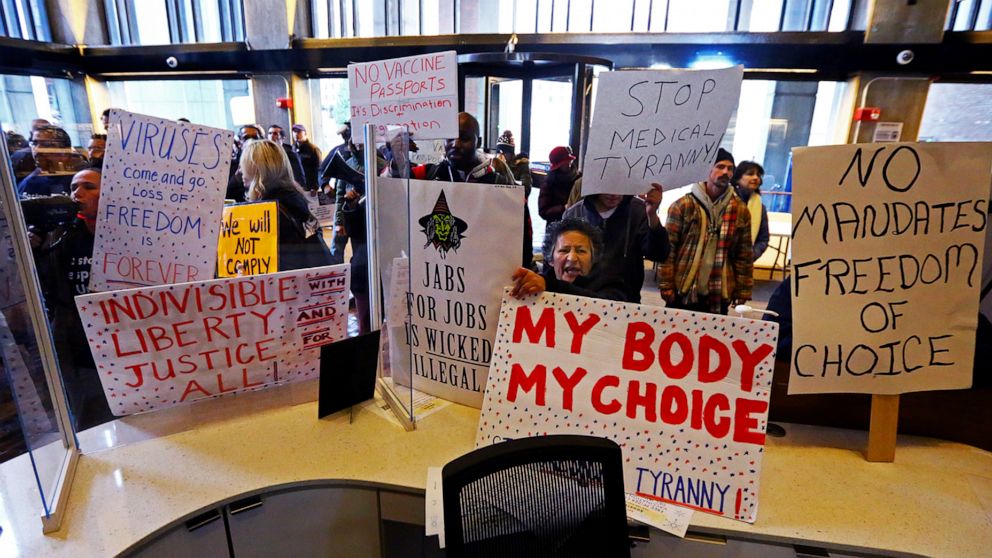Justices spar over vaccine mandates as COVID jolts Supreme Court
Most justices are skeptical of vaccine rules for businesses, health workers.
The Supreme Court on Friday wrestled with the unprecedented COVID-19 public health emergency, authorities' urgent push to protect Americans and the power of federal agencies to impose vaccine mandates or vaccine-or-test requirements on tens of millions of workers.
The court -- during nearly four hours of oral arguments in two highly expedited cases -- appeared to fully comprehend the gravity of the moment for American public health, but many justices voiced reservations about the federal government's authority to impose such policies nationwide.
At issue is a pair of emergency regulations released late last year by the Biden administration and challenged by a coalition of Republican-led states and business groups.
One rule, by the Occupational Safety and Health Administration and set to take effect on Monday, requires private employers of 100 or more employees to ensure they're vaccinated or subject the unvaccinated to a mandatory mask-and-testing policy, at the company's expense.
The Department of Health and Human Services has separately ordered all health care facilities that treat Medicare and Medicaid patients with federal funding to require vaccinations of all workers and staff, with limited exemptions allowed for religious or health reasons. The policy is in effect is roughly half the country after a federal appeals court halted it in other areas.

Combined, both policies would cover roughly 100 million Americans, officials said.
"Traditionally, states have had the responsibility for overseeing vaccination mandates. I just rejected a challenge to one in New Mexico," said Justice Neil Gorsuch. "Why isn't this a major question left to the states and Congress?"
Chief Justice John Roberts shared the concern: "It sounds like the sort of thing that states will be responding to or should be or -- and that Congress should be responding to or should be, rather than agency by agency, the federal government, the executive branch, acting alone."
Twenty-two states already mandate COVID-19 vaccinations for health care workers while six states explicitly ban them, according to the National Academy for State Health Policy. No state issues a similar requirement for private businesses.
"We were hearing from small business owners that they very much valued their freedom to do business their way, and they felt like this was very much an encroachment of that right and that freedom," Karen Harned, executive director of the National Federation of Independent Business, told ABC News Live. "It's Congress who's accountable to the people, not agency officials who are not elected."
The court's three liberal justices voiced emphatic support for the rules.
"Nearly a million people have died," said Justice Elena Kagan. "I don't mean to be dramatic here. I'm just sort of stating facts. And this is the policy that is most geared to stopping all this."
More than 205 million Americans have been fully vaccinated against COVID-19, but tens of millions of others who are eligible have not received their first shot, according to the Centers for Disease Control and Prevention.
"Three quarters of a million new cases yesterday! That's 10 times as many as when OSHA put this ruling," said Justice Stephen Breyer. "Is that what you're doing now, to say it's in the public interest in this situation to stop this vaccination rule with nearly a million new cases every day? I mean, to me, I would find that unbelievable."

Justice Sonia Sotomayor, who joined the arguments remotely from her chambers inside the building because of omicron concerns, dismissed challengers' concerns about labor shortages, noting that the virus is already sidelining workers in key industries.
"Catching COVID keeps people out of the workplace for a long time," she said.
"And, by the way, there is no mandate here for vaccines," she added, alluding to the masking-and-testing option for those who refuse a shot.
Attorney Scott Keller, representing the National Federation of Independent Businesses, which opposes the rule, replied: "States can act, private businesses have acted on historic levels. This is going to cause a massive economic shift in the country, billions upon billions of non-recoverable costs."
The arguments played out as omicron cases are soaring and hospitals are filling up nationwide -- conditions that also jolted court operations.
For the first time, all but one of the justices -- Gorsuch -- wore masks as they entered the chamber. Most kept their faces covered when not speaking. And in another first for the Court, two attorneys presenting arguments in the cases joined by phone, with at least one recently receiving a positive COVID diagnosis.
Solicitor General Elizabeth Prelogar forcefully argued that the government has a moral and legal obligation to protect workers and vulnerable Medicare and Medicaid patients at facilities that receive federal funds.
"Exposure to COVID-19 on the job is the biggest threat to workers in OSHA's history," she said. The agency has estimated that it's vaccine-or-testing rule would save 6,500 lives and prevent 250,000 hospitalizations in just the first six months.

Several conservative justices, including Justice Amy Coney Barrett, suggested that the policy, if well-intentioned, was simply too broad. Barrett wondered aloud about landscape businesses, for example, that work entirely outside and face substantially lower risk of virus transmission. She also questioned how long the agency's emergency authority would last given that COVID may become endemic.
Prelogar argued that there are exceptions for employees who work alone or from home and that Congress explicitly authorized OSHA to protect health and safety of workers in the face of "grave danger." But many of the court's conservatives weren't buying it.
"That was 50 years ago that you're saying Congress acted. I don't think you had COVID in mind," Roberts said of the 1970 Occupational Safety and Health Act. "That was almost closer to the Spanish Flu than it is to today's problem."
Justice Samuel Alito argued that unvaccinated Americans, who face the gravest threat of COVID infection, have chosen to accept the risk and should be allowed to do so. He said the vaccine mandates force Americans to take on a potential risk to their health that may be unwanted.
"I'm not saying the vaccines are unsafe. I'm not contesting that in any way," he insisted. "[But] there is a risk, right? ... Has OSHA ever imposed any other safety regulation that imposes some extra risk on the employee?"
Justice Brett Kavanaugh and Barrett appeared slightly more receptive to the HHS vaccine mandate for health care workers. Kavanaugh noted that it was states challenging the rule, not the facilities or workers themselves raising objections. "Where are the regulated parties complaining about the regulation?" he asked.
Barrett suggested that legal requirements that HHS ensure long-term care facilities have infection control programs seems to explicitly authorize the mandate, but she was less certain about other types of facilities.
"There's an expectation on the part of patients if they show up in a health care system for treatment, whether it's for COVID or for some other underlying condition, that they're surrounded by those that are vaccinated. We do not want to create further risk to those that are vulnerable and in a hospital setting," said Dr. John Brownstein, an epidemiologist and ABC News medical contributor.
The group of states challenging the requirement say the rule will decimate rural health care centers that already have limited staffs.
"All the secretary is doing here is to say to providers the one thing you can't do is to kill your patients," Kagan said bluntly to Jesus Osete, an attorney representing states challenging the health worker rule.
"We're dealing specifically with a vaccine requirement that, again, has historically been in the state's province," Osete replied. "And if Congress wants to give that authority to ... the federal agency here, it has to do so in exceedingly clear language."
Both sides urged the justices to act quickly.
"This is an issue that the justices have to see touches all of us, but whether that's going to mean that they're willing -- at least a majority of them is willing -- to give the federal government the power to act here, I think, is a separate question," said Kate Shaw, a Cardozo Law professor and ABC News legal analyst. "This is a very conservative, newly constituted court that is pretty skeptical of federal power writ large, so I think there's a good chance that one or both of these policies may be struck down."




